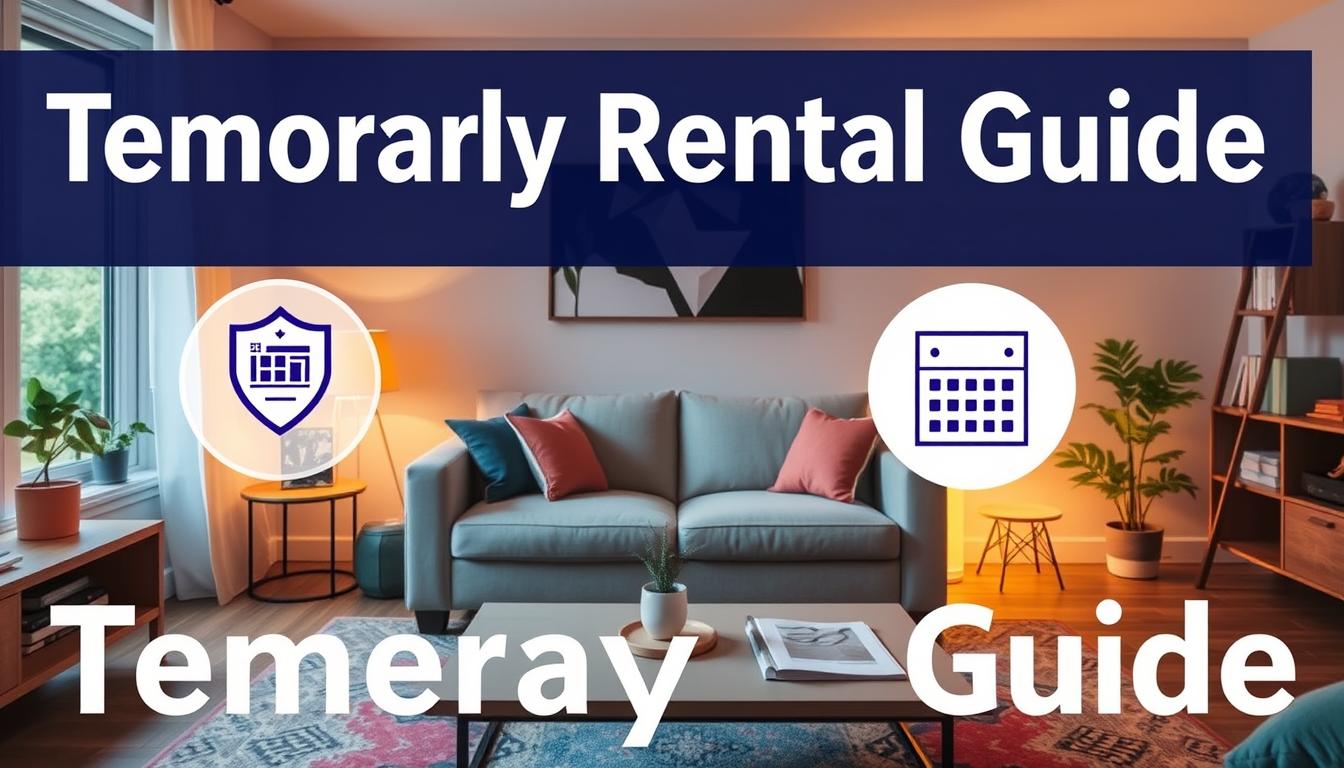Did you know that over 40% of renters have experienced some form of damage or theft during their stay in a temporary rental? This staggering statistic underscores the importance of understanding temporary rental insurance, especially when you’re renting a property for a short period. Whether you’re taking a family vacation, a business trip, or moving temporarily for work, securing the right short-term rental coverage can save you from unexpected financial burdens.
This guide will walk you through the essentials of vacation rental insurance, empowering you with the knowledge to protect your experience effectively. From the basics to the complexities of coverage options, we’ve got you covered, ensuring your peace of mind during your stay.
Key Takeaways
- Temporary rental insurance offers essential protection during short stays.
- Understanding your coverage options can help mitigate unexpected expenses.
- Many renters face potential losses, making insurance a wise investment.
- Coverage can vary significantly, so it’s crucial to know your needs.
- Exploring different providers can lead to more competitive pricing.
What is Temporary Rental Insurance?
Temporary rental insurance is a specialized form of coverage designed for individuals residing in rental properties on a temporary basis. It is particularly beneficial for those engaging in vacation rentals, corporate housing, or short-term leases. This type of insurance offers a layer of protection against unforeseen risks, ensuring that renters can navigate their temporary living arrangements with confidence.
Understanding the Basics
At its core, temporary rental insurance encompasses critical elements such as coverage for personal belongings, liability protection, and defense against unexpected events. It is crafted to mitigate the risks inherent in short-term rentals, providing a safeguard against potential financial burdens. This makes it an indispensable asset for renters seeking to minimize their exposure to unforeseen liabilities.
Importance for Renters
The importance of temporary rental insurance cannot be overstated. Without it, renters are left vulnerable to financial loss due to property damage or legal liabilities. This coverage is pivotal in ensuring that renters can enjoy their temporary living arrangements without the constant worry of unforeseen expenses. It serves as a cornerstone of security, allowing renters to fully immerse themselves in their temporary living experience.
Why You Need Temporary Rental Insurance
Engaging in a rental property experience offers a unique opportunity to explore diverse locales without the long-term obligations of homeownership. Amidst the joy of discovery, the necessity of temporary rental insurance becomes evident. This form of insurance serves as a bulwark against unforeseen events that could potentially disrupt your stay.
Protection from Unexpected Events
The unpredictability of life is magnified when residing in a rental setting. Accidents can occur without warning, encompassing property damage, theft of personal items, or even fires. Rental insurance for short stays acts as a safeguard against these unforeseen occurrences. With vacation property coverage, you are assured that any adverse events will not result in crippling financial burdens. This assurance enables you to savor your journey, unencumbered by the specter of unforeseen expenses.
Peace of Mind During Your Stay
Acquiring temporary rental insurance imbues your travel with an added layer of security, significantly enhancing your overall experience. Envision embarking on a picturesque vacation, free from the anxiety of potential mishaps. This insurance ensures that, should an unfortunate event transpire, you are prepared. Opting for the right coverage can significantly reduce stress, fostering a more serene and enjoyable getaway. Delve into the realm of temporary rental insurance to guarantee that your stay is both pleasurable and devoid of undue worry.
Types of Coverage Available
Exploring temporary rental insurance necessitates an understanding of the diverse coverage options available. These options are crafted to protect your interests during the rental period. Familiarity with these choices is crucial for ensuring comprehensive rental property protection.
Personal Property Coverage
Personal property coverage is paramount for safeguarding your possessions against theft, fire, or water damage. This coverage ensures financial support for replacing or repairing your items in the event of loss or damage. It alleviates the financial strain during a distressing period.
Liability Coverage
Liability coverage offers critical protection against potential legal claims or financial liabilities in the event of an injury on the property. It serves as a safeguard, preventing you from facing unforeseen financial burdens resulting from accidents during your rental tenure.
Additional Living Expenses
When a covered loss renders your rental property uninhabitable, additional living expenses coverage becomes relevant. It assists with the costs of temporary accommodations, meals, and other essential expenses. This support is vital for maintaining your tranquility while addressing any issues at the rented property.
Who Should Consider Temporary Rental Insurance?
Temporary rental insurance acts as a protective barrier for a multitude of travelers and residents. Each demographic encounters distinct scenarios where this insurance’s value is paramount. It ensures safeguarding against unforeseen risks, thereby mitigating potential vulnerabilities while away from one’s primary residence.
Vacation Renters
Vacation renters often find themselves in unfamiliar territories, thereby increasing their exposure to unforeseen events. Vacation rental insurance serves as a bulwark, covering personal effects and offering liability protection. This makes it an indispensable choice for those desiring tranquility during their journeys.
Business Travelers
Business travelers, due to their frequent relocation, are exposed to a myriad of risks. Temporary rental insurance emerges as a vital shield. It not only safeguards corporate assets but also ensures personal belongings are covered during professional engagements. Such protection is vital for upholding professional standards without the encumbrance of anxiety.
Students and New Residents
Students and new residents often lack comprehensive personal property insurance. Rental insurance for short stays fills this gap, providing a necessary layer of protection during transitional phases. Acquiring temporary rental insurance instills confidence, as it safeguards personal belongings amidst periods of change.
How to Choose the Right Policy
The selection of an appropriate temporary rental policy necessitates a meticulous evaluation. Individuals must scrutinize their specific coverage necessities, taking into account their unique circumstances. This entails an assessment of the value of personal property and the identification of potential liabilities that may emerge during a rental stay.
Assessing Your Coverage Needs
Initiating the evaluation of coverage necessities is paramount. Pose the following inquiries to yourself:
- What is the total value of your personal belongings?
- Are there high-value items that necessitate special consideration?
- What liability risks do you foresee during your stay?
Grasping these elements is fundamental to the selection of the most suitable short-term rental coverage, ensuring adequate rental property protection.
Comparing Different Providers
Following the assessment of coverage needs, it is imperative to explore diverse providers. A comparative analysis will unveil which policy aligns with both budgetary constraints and protection requirements. Seek out:
- Customer reviews and ratings
- Claim processes and customer service quality
- Cost-effectiveness of the chosen temporary rental policy
Investigating these aspects can significantly enhance your comprehension of available temporary rental insurance solutions. Soliciting expert counsel is also beneficial; consider visiting this resource for guidance.
Common Exclusions in Policies

The intricacies of temporary rental insurance necessitate a thorough comprehension, particularly for those desiring tranquility in their rental experiences. Policies, though protective, harbor specific exclusions that can render individuals susceptible in particular circumstances. Recognizing these exclusions empowers renters to make informed decisions, thereby circumventing unforeseen setbacks during their tenure.
Typical Limitations
Several prevalent limitations are embedded within vacation rental insurance policies. High-value items, such as:
- Expensive jewelry
- High-end electronics
- Art and collectibles
are frequently omitted from standard short-term rental coverage, necessitating additional endorsements for comprehensive protection.
Situations Not Covered
Several unforeseen events often fall outside the scope of temporary rental insurance. Natural disasters, like earthquakes and floods, are among the most common exclusions. Renters may need to seek separate policies for comprehensive coverage against such risks. As you prepare your travel plans, consider examining these nuances carefully, ensuring your belongings are adequately safeguarded during your adventure. For guidance on different types of coverage, check out this resource.
How to File a Claim
Encountering an issue necessitates the initiation of a claim under your temporary rental insurance. A thorough comprehension of the claims process is paramount to safeguard your interests and ensure reimbursement for any qualifying losses. Adherence to the following steps will facilitate a seamless claims experience.
Steps to Take
Commence the claims process with alacrity. The initial step involves contacting your insurance provider to report the incident. This action is crucial for accessing the benefits of your rental insurance for short stays. Subsequent to this, adhere to these pivotal steps:
- Document the incident meticulously, including photographs of any damages.
- Accumulate all pertinent evidence, such as police reports if necessary.
- Compile receipts for any lost personal property.
- Submit these documents as stipulated by your insurance provider.
- Retain a record of all interactions during the claims process.
Necessary Documentation
Preparation of the requisite documentation is instrumental in expediting the claims process. Typically, essential documents for temporary dwelling insurance claims include:
- Detailed photographs of damages.
- Any applicable police reports.
- Receipts for valuables or personal items that were lost or damaged.
- A completed claims form, accessible on your provider’s website.
It is prudent to acquaint yourself with your policy’s specific requirements to ensure readiness with all necessary documentation. For a comprehensive understanding of the claims process, refer to this guide, which elucidates the fundamental aspects of filing a claim.
The Cost of Temporary Rental Insurance
Grasping the financial implications of temporary rental insurance is crucial for budgetary planning. The premiums for such insurance are influenced by a multitude of factors. Understanding these variables is essential for making well-informed decisions regarding rental insurance for short stays.
Factors Influencing Premiums
Several pivotal elements shape the cost of temporary property insurance:
- Length of Stay: Shorter rentals typically incur lower costs.
- Coverage Amount: Higher coverage limits lead to increased premiums.
- Location: Urban areas may have higher rates compared to rural settings.
- Personal Risk Factors: Factors such as prior claims history or credit score can affect rates.
Average Costs to Expect
Premiums for temporary rental insurance generally fall between $10 to $30 per month. However, those renting higher-value properties may encounter costs exceeding this average. Recognizing these price ranges is vital for effective budgeting when planning a stay.
Temporary Rental Insurance vs. Homeowners Insurance

It is imperative for renters to grasp the distinction between temporary rental insurance and homeowners insurance. Each option is designed to fulfill specific needs, catering to different requirements.
Key Differences
Homeowners insurance is crafted for individuals who own properties, safeguarding against perils such as fire, theft, and liability while residing in their own abode. Conversely, temporary rental insurance is specifically tailored for short-term rentals, making it the preferred choice for travelers in search of vacation property coverage. The primary differences lie in:
- Coverage Scope: Home insurance is geared towards long-term homeowners, addressing a broader spectrum of risks. In contrast, temporary rental insurance is designed to mitigate specific risks associated with brief rentals.
- Policy Length: Homeowners insurance is typically an annual commitment, whereas temporary rental insurance is formulated for shorter durations, mirroring the rental period.
- Personal Belongings: Temporary rental insurance frequently includes coverage for personal property, ensuring the security of your belongings during your stay.
Which is Right for You?
Choosing between temporary rental insurance and homeowners insurance necessitates a thorough evaluation of your lifestyle. For those who frequently travel or rent vacation properties, temporary rental insurance offers supplementary protection against unforeseen events during their journeys. Conversely, homeowners insurance is the preferred option for those who own a home and seek comprehensive protection against various hazards.
Tips for Finding Affordable Policies
Securing affordable temporary rental insurance necessitates a strategic approach. By exploring your options, you can achieve substantial savings while ensuring comprehensive coverage during your stay.
Shopping Around
Engaging in a comparative analysis of insurance providers is paramount. This method allows you to discern the most competitive rates. Insurers often provide comparable coverage, enabling you to prioritize cost and service quality. Leveraging online comparison tools streamlines this process, offering a detailed overview of available options. It is crucial to scrutinize policy terms to guarantee they align with your temporary rental insurance needs.
Discounts and Bundles
Insurance companies frequently offer discounts that can substantially lower premiums. Inquiring about bundling options, which combine rental insurance with other policies, can yield cost savings. Additionally, seeking out promotional offers, particularly during peak seasons, can uncover incentives for vacation rental insurance. Capitalizing on these opportunities ensures you acquire the most cost-effective coverage.
For further insights into the cost of temporary rental insurance and securing the most advantageous deals, visit this link.
Real-Life Scenarios: When Coverage Matters
Exploring real-life scenarios underscores the critical role of temporary rental insurance. Various unforeseen circumstances can arise, necessitating comprehensive coverage options. This ensures optimal protection during your stay at a rental property.
Theft and Vandalism
Upon arrival at your vacation rental, you might find personal items stolen or damaged. Theft and vandalism can strike without warning, causing financial and emotional strain. Temporary rental insurance offers vital protection against such incidents, mitigating the financial impact and alleviating stress.
Natural Disasters
Natural calamities, such as hurricanes, floods, and earthquakes, pose significant threats to rental properties. These events can result in substantial damage or even total loss. Vacation rental insurance is indispensable in such scenarios, facilitating swift repairs and recovery without imposing undue financial burdens.
Final Thoughts on Temporary Rental Insurance
In conclusion, the significance of temporary rental insurance for both travelers and renters is undeniable. It serves as a bulwark against unforeseen events, ensuring the safety of personal belongings and mitigating liability risks. Opting for the appropriate short-term rental coverage empowers individuals to savor their journeys without the specter of unexpected calamities.
Summing Up the Benefits
The advantages of acquiring rental insurance for short-term engagements transcend mere security; they encompass a profound sense of tranquility and fiscal protection during every excursion. By meticulously evaluating your unique requirements and delving into the array of policies available, you can make decisions that fortify your position in any scenario. Investigating options for temporary rental insurance will illuminate the path to the most suitable solution for your needs.
Encouragement to Get Protected
It is imperative to prioritize your safety by contemplating the acquisition of temporary rental insurance. Whether you are a seasoned traveler, a professional on the move, or someone seeking a brief respite, investing in rental insurance for short stays can be transformative. Take the initiative to safeguard your experiences, and set forth on your journeys with unwavering confidence, assured in the knowledge that you are comprehensively protected.
FAQ
What exactly is temporary rental insurance?
Temporary rental insurance is a specialized form of coverage designed to protect individuals renting properties for short durations. It typically includes protection for personal property, liability coverage, and safeguards against unforeseen incidents that may occur during your stay, making it ideal for vacation rentals and temporary housing solutions.
Why should I consider vacation rental insurance?
Vacation rental insurance provides essential protection against unexpected events such as theft, damage, or accidents during your stay. Having this coverage allows you to enjoy your time away with peace of mind, knowing you are financially protected against potential mishaps like fire or natural disasters.
What types of coverage are available under temporary rental insurance?
Coverage options typically include personal property coverage, which protects your belongings, liability coverage, which defends against legal claims if an injury occurs on the property, and additional living expenses coverage, which supports you financially if you need to stay elsewhere due to issues in the rental.
Who is eligible for temporary rental insurance?
Temporary rental insurance is beneficial for a range of individuals, including vacation renters, business travelers staying in unfamiliar locations, and students or new residents who may not have personal property insurance. It helps protect all types of renters during their time in temporary accommodations.
How can I choose the right temporary rental policy?
To select the right policy, start by assessing your coverage needs based on the value of your belongings and potential liability exposure. It’s also important to compare different insurance providers to find competitive rates and policies that fit your specific rental situation.
Are there common exclusions in temporary rental insurance policies?
Yes, policies often have common exclusions that renters should be aware of. For example, items like expensive jewelry or high-value electronics may not be fully covered without additional endorsements, and certain catastrophic events, like floods or earthquakes, typically require separate policies.
What are the steps to file a claim under temporary rental insurance?
Filing a claim involves notifying your insurance provider about the incident, providing necessary documentation such as photos of damages, police reports (if applicable), and receipts for any lost personal property. Each insurer may have different requirements, so familiarizing yourself with the specific process in your policy is helpful.
How much does temporary rental insurance usually cost?
Costs for temporary rental insurance can vary significantly depending on factors like the rental’s location, coverage amount, and personal risk factors. Generally, premium costs range from to monthly, but higher-value rentals may incur additional charges.
How does temporary rental insurance differ from homeowners insurance?
Temporary rental insurance and homeowners insurance serve different purposes. Homeowners insurance protects properties owned by individuals, while temporary rental insurance covers short-term rentals, focusing on risks relevant to temporary stays. Your choice will depend on your housing and travel lifestyle.
What tips can help me find affordable temporary rental insurance?
To find affordable temporary rental insurance, consider shopping around for quotes from multiple providers and taking advantage of discounts or bundle offers that may be available. Being aware of any special promotions or deals during peak travel seasons can also help you save on your vacation rental insurance.
Can you provide examples of when temporary rental insurance is necessary?
Real-life scenarios, such as theft or vandalism in vacation rentals, showcase the need for temporary rental insurance. Similarly, natural disasters like hurricanes or floods can severely impact rentals, emphasizing the importance of having adequate coverage in place to manage such risks effectively.
